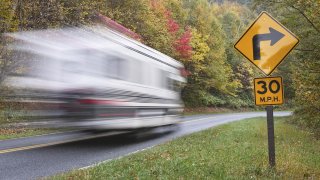
- In 2019, 9,478 Americans died as a result of drivers speeding, more than a quarter of all traffic fatalities that year.
- Despite this, millions of Americans continue to speed every year.
- Some experts argue that the current speed limits might be too unrealistic to have any impact on how fast people drive.
In 2019, 9,478 Americans died as a result of drivers speeding, more than a quarter of all traffic fatalities that year. The National Highway Traffic Safety Administration predicts that speed-related crashes cost the U.S. more than $40 billion each year. And the emotional toll for those left behind is immeasurable.
"I think we don't really think about this issue," said Amy Cohen, a co-founder of Families for Safe Streets, whose 12-year-old son was killed by a speeding car. "I started speaking out because it was horrific to bury your child. And I would not want this to happen to anyone else."
Speed limits were created to avoid situations like what happened to the Cohens. Yet, millions of Americans continue to speed every year. Nearly half of the drivers in a 2020 survey by the AAA Foundation for Traffic Safety reported they have sped at least 15 mph over the limit on freeways.
Get Tri-state area news and weather forecasts to your inbox. Sign up for NBC New York newsletters.
"A lot of that is our culture, right?" said Zabe Bent, director of design at the National Association of City Transportation Officials. "We have a culture of basically driving and sort of trying to achieve the speed limit as a target rather than a limit."
But some experts think changing speed limits would not have any impact on how fast people drive.
Jay Beeber, executive director at Safer Streets L.A., said, "People drive the way the road is built, that's what happens. And doing anything else in terms of speed limits is just simply wasting your time."
Money Report
Watch the video to find out more about how speed limits are set in the U.S. and if they can be improved to make our roads safer.






